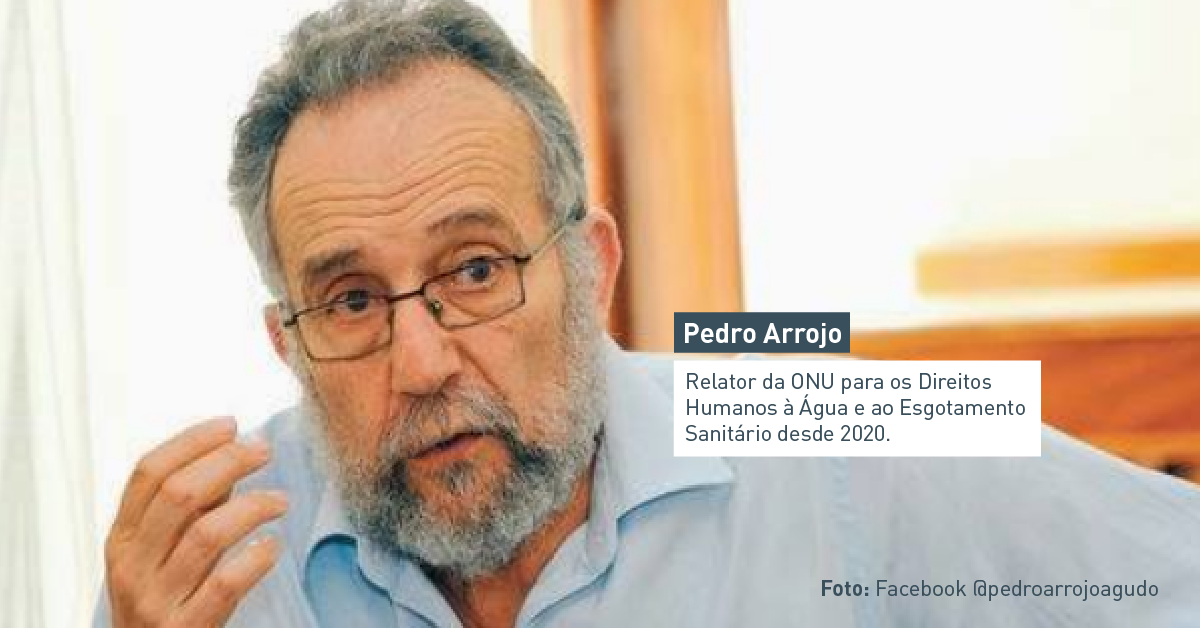Reaching universal access to water and sanitation is looking at those in most need
Published in 26 Jul 2022
Written by By the IAS team
Tags:

The Human Rights to Water and Sanitation (HRtWS) are far from being respected, even 12 years after their recognition by the United Nations. Almost half of the world population still does not have access to adequate sewage collection services. People in precarious urban areas, rural areas and impoverished communities do not have access to these services, which, according to the current UN Special Rapporteur on HRtWS, Pedro Arrojo, are essential for democracy.
In an interview with the IAS, Arrojo recalled that we are halfway through the deadline of Sustainable Development Goal 6, which consists of ensuring the availability and sustainable management of drinking water and sanitation for all by 2030, but only a quarter of the targets have been met.
Background
In September 2015, Brazil and 192 other member countries of the United Nations adopted the 2030 Agenda for Sustainable Development, which aims to foster development all over the world and improve the quality of life of all people. Accordingly, 17 Sustainable Development Goals (SDGs) and 169 targets have been established, making up a global agenda for the development and implementation of public policies to guide humankind towards a sustainable future by 2030. SDG 6 is about ensuring the availability and sustainable management of water and sanitation for all. In Brazil, of the eight targets set for SDG 6, we are moving backwards on six, and the other two are at risk. Approximately 36.6 million Brazilians still do not have access to drinking water supply, and only 50.8% of the sewage is treated.
Arrojo calls for investments in solutions that require less financial and technical support, especially for populations living far from large urban centers, and highlights the importance and involvement of women, who are protagonists in the fight for better living conditions in their communities. Arrojo also warns about the urgency of caring for the environment and preserving ecosystems, especially in the face of the emergency imposed by climate change.
Spanish researcher Pedro Arrojo was appointed rapporteur in 2020, replacing Brazilian Léo Heller, whose mandate lasted from 2014 to 2020. Arrojo has a Master’s in Physics and is a Professor Emeritus of Economic Analysis. The highlight in his mandate is the fight against threats to the human rights to water and sanitation arising from climate change and pandemics, such as COVID-19
His fight for changes in the water management policy in Spain earned him the Goldman Prize in 2003, which is considered "the Nobel Prize for Ecology".
What is the role of a UN Rapporteur?
Every six years, the UN Human Rights Council appoints an expert to act as a special rapporteur. Rapporteurs carry out country visits and attend assemblies and extraordinary meetings to set goals to guarantee the right they are responsible for. It is their duty to oversee, advise and publish information on the achievement of the human right they champion. In this series of interviews, we conversed with the United Nations Special Rapporteurs on the human rights to water and sanitation.
Using the toilet is still a taboo
According to Arrojo, it is easy to talk about water when the subject does not involve toilets. “Talking about water is not a problem. The topic is understood quickly, but addressing vital needs related to the use of the toilet causes embarrassment due to cultural norms, and it is a topic that ends up being banned from conversation”. Therefore, the United Nations emphasizes the need to discuss access to toilets.
“The provision of facilities in conditions of privacy and security to meet our needs is covered by the human right to sanitation. The lack of a toilet in a household implies open defecation, oftentimes in unhealthy conditions”, he points out. Arrojo believes that a toilet is the most basic and rudimentary way to comprehend the right to sanitation.
“It is necessary to include the menstrual hygiene needs of women, who make up 50% of the world population, and to pay attention to rivers and aquifers because it is an obligation, it is the responsibility of each one of us, of the municipalities and states, to guarantee that the sewage that returns to rivers and aquifers is treated; otherwise we put the health of ecosystems at risk, we destroy them. Not only ecosystems, but also people’s health and lives.”
“A financial deficit does not justify the slow progress towards universal access”
Arrojo claims that the financial deficit argument used by countries to justify the slow progress towards universal access to water and sanitation is false. “This deficit invites us to fund sanitation services, that is, shows us that private capital must come to our help in this challenge. Financial capital does not aim to meet the human rights of the billions of people who lack access to sanitation or drinking water. We are talking about people in a situation of severe poverty and marginalization. They are not business for these large institutions.”
According to Arrojo, we cannot use today the same argument used in 2008, amid the economic crisis at the time, in which “wrong austerity measures were imposed, using all available public funds to save from bankruptcy the same banks that had pushed us into the financial and economic crisis”, he criticizes.
Arrojo claims that there is currently an abundance of public funds. “In fact, we are talking about the Green New Deal; again, there are major public funds in all the most developed countries. The question is: do we want to devote a significant part of these funds to accelerating the pace towards universal access to drinking water and sanitation, to strengthening public health systems, which are one of the major consensuses that the suffering brought about by the pandemic has created in the world: the need to strengthen health systems, and therefore the water and sewage services available to them?”
“We need this service, a global and national challenge of democratic dignity, not a business opportunity. I have been insisting on this issue with governments. It is a matter of political decision. And individuals, peoples, citizens, above ideological or partisan convictions, are calling for this topic be treated as a priority and that a significant part of the public funds available today be dedicated to this challenge.”
Decentralized solutions for sanitation
Strengthening sanitation from the bottom up, from the territory, creating more accessible decentralized systems managed by the community is one of the steps to ensure universal access to water and sanitation without leaving anyone behind. Therefore, according to Arrojo, we must move away from major construction works, such as large, centralized sewage treatment networks, towards the creation of filtration and extensive sanitation technologies managed by the communities themselves, respecting local nature and financial viability.
“We don't need large sewage treatment systems, this is for big cities, but big cities also have enough means and wealth to develop. Therefore, I believe that the UN, the Governments, the World Bank must intervene by providing financial and technological support, using technologies that fit local environmental conditions and communities”, he explains.
The UN rapporteur praises the leadership role of the community, including women as protagonists in the management of decentralized sewage treatment systems. “If we want to speed up the pace, we must think about which social sectors are the most urgent. We are talking about impoverished communities that suffer the worst consequences of the non-implementation of the human rights to water and sanitation. And it is them who are making the greatest efforts to ensure that their families and communities have access to water and sanitation. And I go further: empower women and girls to speed up the pace and they will!”


